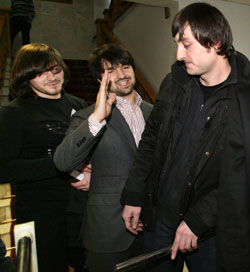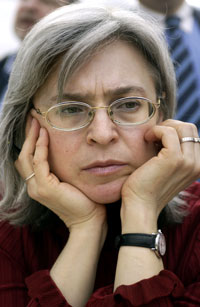Russia’s Investigative Committee has named the main suspects in the October 7, 2006, murder of Anna Politkovskaya. But the news did not cause a stir. Russian journalists reacted to it rather languidly; for instance, Novaya Gazeta, where Politkovskaya worked, did not make any notable comments.
This is not because Politkovskaya’s murder–now five years old–has been forgotten in Russia. The tepid interest is mostly due to the fact that there are no new names among the suspects.
Authorities have once again charged three Chechen brothers–Rustam, Ibragim, and Dzhabrail Makhmudov; the Chechen criminal leader Lom-Ali Gaitukayev; and Interior Ministry officers Dmitry Pavlyuchenkov and Sergei Khadzhikurbanov with various involvements in the killing.
All these names became well known during the first trial over Politkovskaya’s murder. Back in February 2009, a jury acquitted three defendants–Khadzhikurbanov and two Makhmudov brothers, Ibragim and Dzhabrail. (Rustam Makhmudov, whom the investigation considers the gunman, was sought on an international warrant and was not in the dock.) Gaitukayev, whom the investigation has now named an organizer of the slaying, was considered a witness for the prosecution at the time. Khadzhikurbanov, the third defendant in the 2009 trial, is also considered an organizer of the slaying. Ibragim and Dzhabrail Makhudov’s charges–accomplices in the killing–remain the same as two years ago.
All of the suspects have denied all charges against them, except for retired Lt. Col. Pavlyuchenkov, who has entered into plea negotiations.
Pavlyuchenkov’s alleged role in the murder has changed several times since the first Politkovskaya murder investigation. Initially, Pavlyuchenkov was considered a witness in the case; then, he was declared an organizer of the slaying. Back in August, the Investigative Committee announced that it was Pavlyuchenkov who received money (from an unknown party) for Politkovskaya’s murder, and it was Pavlyuchenkov who distributed the “logistical tasks” of the crime among the members of the gang he allegedly formed for the purpose. Now, however, Pavlyuchenkov is no longer considered an organizer but an accomplice in the murder, who reportedly abused the powers of his office (as head of surveillance at the Interior Ministry) when ordering the tracking of Politkovskaya’s moves.
After a jury acquitted all defendants in 2009, the verdict was overturned by Russia’s Supreme Court, but a new trial was not scheduled. It became evident that two years had not been enough for the Investigative Committee to solve the crime. They failed to unravel the chain of mastermind-organizer-accomplices-gunman. By returning the case to investigators for further work, the Supreme Court confirmed this.
Why was such a half-baked case allowed to go to court at all?
Novaya Gazeta Deputy Editor Sergey Sokolov says it was because, with the second anniversary of Politkovskaya’s killing approaching, “investigators were hastened to deliver results.” A contributing factor was the prosecution’s tendency to win in Russian courts. The number of acquittals issued in Russia is negligible — statistics show that acquittals nowadays are fewer than in Stalin’s time. However poorly an investigation may be conducted, the judge, as a rule, would side with the prosecution. Also, the professionalism of investigators tasked with probing high-profile contract killings falls short. This was particularly clear in Politkovskaya’s case.
Vyacheslav Izmailov, a special Novaya Gazeta correspondent who has covered the North Caucasus for many years, recalls his interactions with the team of investigators conducting the initial Politkovskaya murder probe. “They suggested that we, journalists, carry out significant parts of the investigation,” Izmailov says. “For instance Petros Garibyan [who continues to head the Politkovskaya murder probe] offered that I meet with Ramzan Kadyrov [the formidable Chechnya president whom Politkovskaya criticized sharply]. Garibyan was asking that I find out what Kadyrov thought about Politkovskaya’s killing, what his version [of who murdered her] was.”
Have investigators been successful in buttressing their case with solid evidence this time around?
According to Anna Stavitskaya, lawyer for the Politkovskaya family, progress has undoubtedly been made. “I have not yet studied the materials of the investigation but having [suspected] organizers under indictment can definitely be considered headway toward solving this crime,” Stavitskaya says.
Dzhabrail Makhmudov’s lawyer, Murad Musayev, told CPJ he does not believe investigators genuinely want to solve Politkovskaya’s killing. Rather, he says, they have only one goal–to prove their version of events.

“My client has been charged with nothing new,” Musayev told CPJ. “The only addition to the investigation is Pavlyuchenkov, who is a totally controllable figure. In other words, he will be giving the kind of testimony that investigators would need him to give.”
“I am certain that he [Pavlyuchenkov] is involved in this case,” Musayev says. “During the first trial it was no secret that he and his subordinates at the Operational Surveillance Department [one of the most secretive branches of Russia’s Interior Ministry] were the people who organized Politkovskaya’s murder. I am absolutely convinced that the killer, too, is among the representatives of that department.”
Novaya Gazeta‘s Sokolov, who heads the paper’s own journalistic investigation into Politkovskaya’s killing, says the paper’s efforts this spring helped get on-the-record witness testimony about Pavlyuchenkov’s role in the crime, which led to his arrest.
Sokolov told CPJ that Pavlyuchenkov’s subordinates at the surveillance department are each now being investigated as potential accomplices. Some of those subordinates, Sokolov says, have begun testifying in exchange for being charged with less serious crimes, which would, in turn, mitigate their prospective punishments.
“An entire mechanism of illegal, unsanctioned surveillance of many persons [by officers of the Interior Ministry’s Operational Surveillance Department] has been revealed,” Sokolov says. “They received money to conduct foot surveillance for a fee of US$100 an hour.”
Negotiating with suspects in order to receive evidence that could strengthen the prosecution’s case in exchange for mitigated charges and sentences is an accepted–and absolutely legal–practice. This practice, however, would not be worthwhile if it did not lead to the capture and prosecution of the crime’s mastermind.
While the second investigation into Politkovskaya’s murder may have strengthened the evidence against the suspected immediate killers, it has demonstrated no progress toward identifying those who bought and sent them to the journalist’s doorstep. Moreover, when it comes to the mastermind, the investigation is becoming more politicized.
Specifically, the names of the disgraced oligarch Boris Berezovsky and persons from his alleged circle have been floating around as potential benefactors of Politkovskaya’s elimination. Among Berezovsky’s circle, according to authorities, are Chechen separatist leader Khozh-Akhmed Nukhayev (who has been named the mastermind of Paul Klebnikov’s killing in 2004); former spy Aleksandr Litvinenko, who was poisoned to death in London with radioactive polonium soon after Politkovskaya was murdered; and exiled Chechen separatist Akhmed Zakayev.
The information that Zakayev and Litvinenko are suspected of involvement in the killing of Politkovskaya was first reported by the news agency Rosbalt on October 18. The Investigative Committee has neither confirmed nor denied this information. The Rosbalt report is based on the witness testimony of former security service officer and current parliamentary deputy Andrei Lugovoi–the same Lugovoi whom Scotland Yard has charged in Litvinenko’s killing.
“Several days after Politkovskaya’s murder, [then] President Putin publicly announced his opinion that the masterminds are malevolent oligarchs abroad,” Sokolov says. “A day later, [Prosecutor General Yuri] Chaika corroborated this. And right after them, a number of other people swarmed the Investigative Committee to suggest that Berezovsky is to blame. Lugovoi gave similar testimony at the very beginning of the investigation, but that testimony was so abstruse that it was never included in the final indictment.”
Lawyer Musayev says the question of who masterminded the murder of Anna Politkovskaya remains a “murky realm to me.” The culprits will become known only when “real accomplices like Pavlyuchenkov are pressed to the wall,” Musayev says, “and when they start giving truthful information as opposed to testimony authorities want to hear.”
